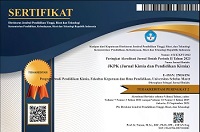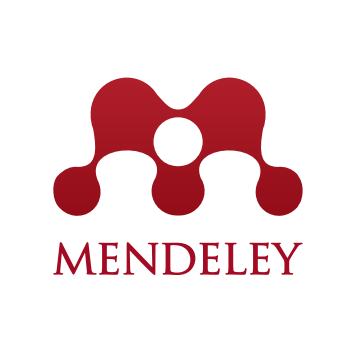Using Think-Pair-Share to Develop Students' Social and Emotional Competencies in Chemistry Learning
Abstract
The aim of this study was to analyze students' social and emotional competencies through the integration of Think Pair Share (TPS) and a Social and Emotional Learning (SEL) approach to topics related to Acids and Bases. Social and emotional learning (SEL) is the process through which children and adults understand and manage emotions, set and achieve positive goals, feel and show empathy for others, establish and maintain positive relationships, and make responsible decisions.. The study involved thirty-five 11th grade students in one of private school in Jakarta and was conducted between January and April, 2017. A qualitative methodology was employed to analyze students’ social and emotional competencies using interviews, classroom observations, reflective journals, and student worksheets. The application of a SEL approach was carried out by integrating it with a TPS strategy. In the Think stage students were given the opportunity to explore their understanding of acids and bases and to solve problems individually. In the Pair stage they could communicate their insights to the group, and in the Share stage they had occasion to present their group perspectives and respond to others. The five social and emotional competences found in this study were; self awareness, self management, social awareness, relationship management, and responsible decision making. Self awareness was demonstrated by understanding a student’s abilities, their needs, and their self- confidence. Self management was indicated by a student’s ability to manage pressure, plan strategies, and seek help. Social awareness competencies were analyzed through the development of students' attitudes to diversity and how they demonstrated care for friends. Relationship management competencies were identified by observing a student’s ability to manage friendships, how they overcame differences, and whether they provided assistance to each other. The responsible decision making competency was determined by observing how students made decisions when trying to solve a problem and whether they were able to plan a strategy when facing pressure. Whilst integrating SEL the researchers were challenged by the need to empower students, encourage teachers to stimulate students’ social and emotional competencies, and to manage time constraints. Integrating SEL into chemistry learning provided opportunities for students to develop their social and emotional competencies through independent thinking activities, group discussions, and presentations to their peers.
Keywords
Full Text:
PDFReferences
Kemendikbud. Permendikbud No. 20 tentang Standar Kompetensi Lulusan Pendidikan Dasar dan Menengah. Jakarta: Kemendikbud. 2016.
Kemendikbud. Permendikbud No. 21 tentang Standar Kompetensi Isi Pendidikan Dasar dan Menengah pasal 1 ayat (2). Jakarta: Kemendikbud. 2016.
E, Jessie. Empowering Metacognition Through Social-Emotional Learning: Lesson for the Classroom. Singapore: CENGAGE Learning. 2009.
J. A Durlak, R. P Weissberg, A. B Dymnicki, R. D Taylor, & K. B Schellinger, “The Impact of Enhancing Students’ Social Emotional Learning: A Meta-Analysis of School-Based Universal Interventions”. Society for Research in Child Development Inc., vol 82, no.1, pp. 405-432, 2011.
DOI: 10.1111/j.1467-624.2010.01564
R. P. Weissberg, J. A. Durlak, C. E. Domitrovich & T. P. Gullotta, Social and emotional learning: Past, present, and future. Handbook of social and emotional learning: Research and practice. New York, NY: Guilford,2015.
V. Coelho, V. Sousa, & A.P. Figueira.. “The Impact of a School Based Social and Emotional Learning Program on the Self-Concept of Middle School Students”. Revista de Psicodidáctica, Vol.19, (2), 347-365, 2014 ISSN: 1136-1034 eISSN: 2254-4372.
DOI: 10.1387/RevPsicodidact.10714
M. J. Elias, J. E. Zins, R. P. Weissberg, K. S. Frey, Greenberg, T. M. Haynes, M. Norris, K. Rachael, S. Stone, E. Mary & P. T. Shriver, Promoting social and emotional learning: Guidelines for educators. Alexandria, VA: Association for Supervision and Curriculum Development, 1997.
J. E. Zins, R. P. Weissberg, M. C. Wang & H. J. Walberg (Eds.). Building academic success on social and emotional learning: What does the research say? New York: Teachers College Press, 2004.
DOI: 10.1080/10573560600992837
CASEL Leadershp Team. Safe and Sound: An Educational Leader's Guide to Evidence‐based Social and Emotional Learning (SEL) Programs. Cicago:CASEL, 2003.
D. T. Boleng & A. D. Corebima, “Cooperative learning models having better potency to improve social attitude of multiethnic senior high school students at Samarinda,” Indonesia. Journal of Educational Research and Reviews, vol. 2, no. 3, pp. 36-44, 2014.
Hetika, I. Farida & Y. P. Sari, “Think pair share (TPS) as method to improve student’s learning motivation and learning achievement.” Dinamika Pendidikan, vol. 12, no. 2, pp. 125-135, 2017.
DOI: 10.1080/10573560600992837
Miles & Huberman. Qualitative Data Analysis: An Expanded Sourcebook. New York: Sage Publication. 1992.
P. Quinn, Cooperative Learning and student Motivation. Education and Human Development Master’s Theses. The College at Brockport: State University of New York. 2006.
S. Altun, “The Effect of Cooperative Learning on Students’ Achievement and Views on the Science and Technology Course”. International Electronic Journal of Elementary Education, vol. 7, no.3, pp. 451-468. 2015.
Kemendikbud. Permendikbud No. 24 Tahun 2016 tentang Kompetensi Inti dan Kompetensi Dasar Lampiran . Jakarta: Kemendikbud, 2016.
Kemendikbud. Permendikbud No. 24 Tahun 2016 tentang Kompetensi Inti dan Kompetensi Dasar Pasal 2, Ayat (5). Jakarta: Kemendikbud, 2016.
Refbacks
- There are currently no refbacks.








